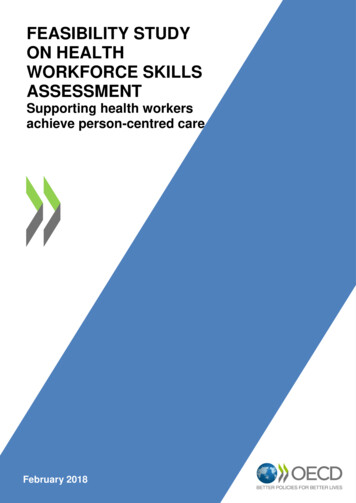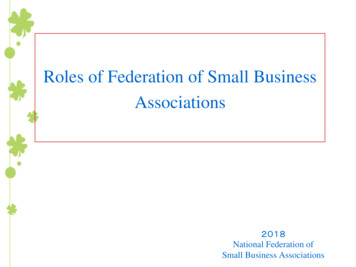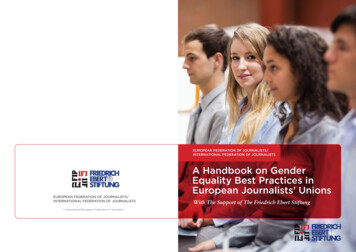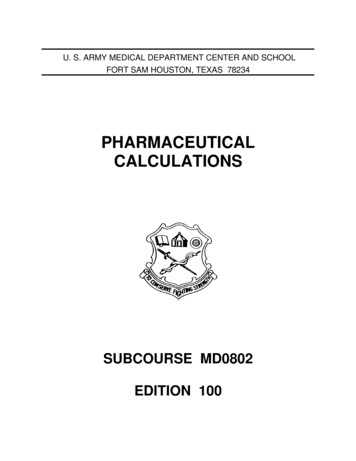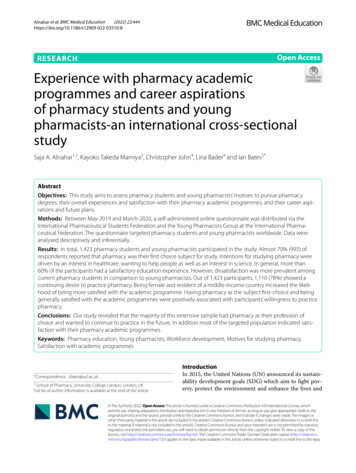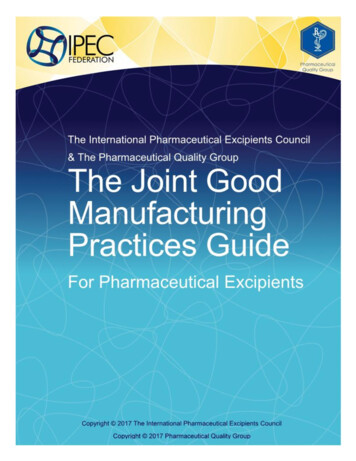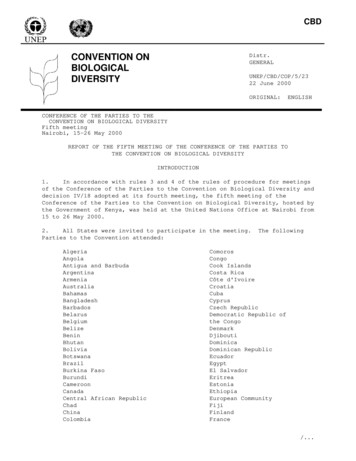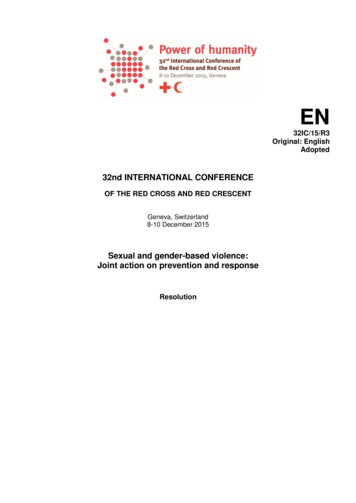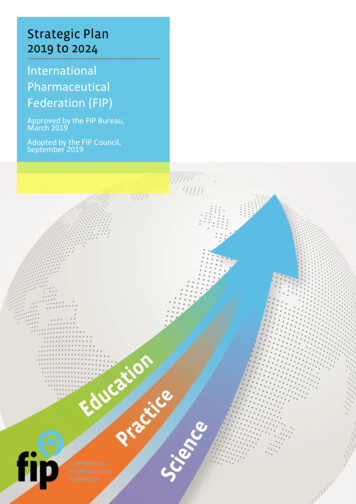
Transcription
InternationalPharmaceuticalFederation (FIP)Approved by the FIP Bureau,March 2019Adopted by the FIP Council,September 2019
p2 ColophonCopyright 2019 International Pharmaceutical Federation (FIP)International Pharmaceutical Federation (FIP)Andries Bickerweg 52517 JP The HagueThe Netherlandswww.fip.orgAll rights reserved. No part of this publication may be stored in any retrieval system or transcribed by any form ormeans – electronic, mechanical, recording, or otherwise without citation of the source. FIP shall not be held liable forany damages incurred resulting from the use of any data and information from this report. All measures have beentaken to ensure accuracy of the data and information presented in this report.Recommended citation: International Pharmaceutical Federation (FIP). Strategic plan 2019-2024. The Hague,International Pharmaceutical Federation, 2019.
PurposeThe purpose of the Strategic Plan of the International Pharmaceutical Federation (FIP) is to:Articulate the mission of FIP to the world and to key stakeholders to further strategic partnerships, purposefulcollaborations and enhanced benefits for members and the profession;Define the scope and guide the activities of the FIP for the next five years;Maximise the strengths, mitigate weaknesses and threats, and take advantage of opportunities for growth that havebeen identified in the global healthcare environment;Establish measures of success and demonstrate delivery for the benefit of members, member organisations, patientsand the public.Importance of consultation and engagementThe motivation for a renewed strategic plan was to enable FIP to increase its relevance and reach in recognition of thefast-changing landscape of pharmacy and healthcare, globally and within individual countries and healthcare systems.FIP wanted and wants to engage and involve its member organisations, individual members and other key stakeholdersin appraising and addressing the challenges that the profession, its partners, healthcare systems, and citizens will facein the years to come.Current Members, 2018:Chair of the Committee Dr Carmen Pena, FIP President (Immediate Past President from September 2018)Mr Israel BimpeProf. William CharmanMs Manjiri GharatDr Linda HakesMr Dominique Jordan (President from September 2018)Prof. Ross McKinnonMr Thomas MenighanDr Miranda SertićMs Ema Paulino, in her role as Interim CEO, and latterly Dr Catherine Duggan as CEO from June 2018The FIP Bureau, FIP member organisations, FIP section presidents were involved in the consultation work.ContextFIP has led the profession globally since 1912. During that time, the organisation has expanded and organised itself toinclude, represent and advocate for many types, sectors, sections across pharmacy, pharmacists and pharmaceuticalscience. Like all membership organisations, FIP must adapt to the demanding challenges facing the professionworldwide, in order to thrive. FIP has an opportunity to forge different relationship with its member organisations, to focus on the differing needs ofregions and nations and ensure the advancement of healthcare in all parts of the world. FIP has an ideal opportunity
p4 through collaboration with its member organisations to reflect experiences from all countries with advanced pharmacypractice and can focus and adapt to specific needs and conditions. By embracing advances in IT, automation, technology, genomics and biologicals, pharmacists and pharmaceuticalscientists and educators can embrace new opportunities and grow their practice and science accordingly. Pharmacistswill become medication managers by embracing new roles in primary care or filling other gaps in the healthcare system,while developing new practice and interdisciplinary models to enhance patient access to pharmaceutical care. FIP will work with others and set a new course for the pharmacy profession. FIP will increase flexibility and ensureefficient and effective governance in order to effect change in the broader health care environment. It is in the contextof wider global change that FIP is setting a new vision, a new mission and strategic outcomes, as described in thisdocument.
VisionMissionStrategic OutcomesBusiness PlanTeam plans and appraisalsThe layout of theStrategic PlanThe Vision, the Mission andthe six Strategic Outcomesagreed by the FIP Bureau andCouncil.The Business Plan andassociated team plans will beinformed by the agreed strategyand will follow on an annualcycle.
p6 A world where everyone benefits from access to safe, effective, quality and affordable medicines and healthtechnologies, as well as from pharmaceutical care services provided by pharmacists, in collaboration with otherhealthcare professionals.FIP supports global health by enabling the advancement of pharmaceutical practice, sciences and education.FIP will: Advocate for the full utilisation of pharmacists’ expertise for the benefit of people and healthcare systems; Promote pharmacy as the first point of access for pharmaceutical care for every person in the world; Support and strengthen the integrity of the pharmaceutical supply chain from manufacturing to patientaccess; Improve health outcomes by the development and implementation of pharmacy services; Support the science-based development and regulation of medicines and health technologies to meethealthcare needs; Support pharmaceutical workforce development around the world to deliver our vision; Collaborate with international agencies, partners, and other healthcare professions, to ensurecomprehensive and integrated health care for all.
FIP will collaborate with all its members and observers to maximise the global influence and contributions to healthcareof pharmacists, pharmaceutical scientists and pharmacy educators. FIP commits to strive for the following six strategicoutcomes to be achieved:FIP will:1.1 Advocate for everyone to have access to the medicines they need in accordance with the principles of UniversalHealth Coverage1.1.2 Collaborate with global and international agencies and partners to work to eliminate medicine shortages, substandard and falsified medicines.1.3 Collaborate with global and international agencies to ensure access and affordability to essential medicines.FIP will:2.1 Provide leadership and support to pharmacists to ensure people have the information they need and value aboutmedicines and services, in order to derive the maximum benefit from them.2.2 Provide leadership and support to pharmacists to empower people to take better care of themselves, throughprevention strategies and health promotion.2.3 Collaborate to create and sustain policies and practices that support each person to make informed choices in areassuch as medication adherence.FIP will:3.1 Support the discovery, development and innovations in medicines, health technologies, and services.3.2 Work with member organisations and partners to set usable standards in areas of pharmaceutical care,science, research and education.3.3 Enable sustainable pharmacy services to ensure the responsible use of innovations in medicines, with appropriateremuneration.1Universal health coverage (UHC) is defined as ensuring that all people have access to needed health services (including prevention,promotion, treatment, rehabilitation and palliation) of sufficient quality to be effective while also ensuring that the use of theseservices does not expose the user the financial hardship. Universal health coverage has therefore become a major goal for healthreform in many countries and a priority objective of WHO.
p8 FIP will:4.1 Support and empower pharmacists to provide high quality person-centred pharmaceutical care to improve healthoutcomes for individuals and populations alike.4.2 Set standards and advocate for sustainable pharmaceutical care services which ensure the responsible use ofmedicines.4.3 Work to reduce the abuse and misuse of medicines to ensure patient safety and public benefit.FIP will:5.1 Establish strategic partnerships across international agencies and organisations to achieve shared outcomes for thebenefit of patients and the public.5.2 Work in partnership with patient organisations to align pharmacy services with patient needs.5.3 Promote the responsible use of limited healthcare resources by helping people stay healthy, reducing unnecessaryuse of medicines, and preventing adverse drug events.5.4 Collaborate with relevant organisations on shared projects to deliver improved health benefits and public healthfor all.FIP will:6.1 Focus on our members in all that we do.6.2 Develop future leaders from all parts of the organisation, the profession and the globe.6.3 Facilitate and enable the sharing of relevant knowledge and professional development tools for all members, acrosscountries and regions.6.4 Improve decision-making processes and models for developing business to ensure FIP continues to grow anddevelop.
Health Coverage1. 1.2 Collaborate with global and international agencies and partners to work to eliminate medicine shortages, sub-standard and falsified medicines. 1.3 Collaborate with global and international agencies to ensure access and affordability to essential medicines. FIP will:

